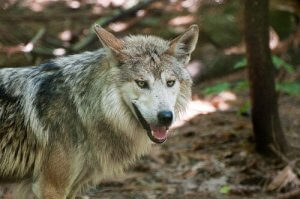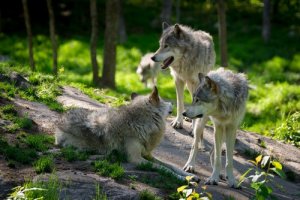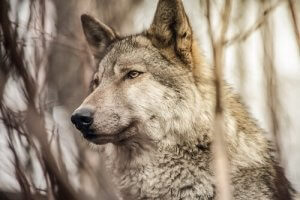The Relationship Between Farmers and Wolves


Written and verified by the lawyer Francisco María García
The relationship between farmers and wolves is a strained one, to say the least. While conservationists battle to save a species on the brink of extinction, many farmers have seen their livestock attacked, and their profits fall.
The relationship between farmers and wolves: recent studies
A survey carried out between 2012 and 2014 into the relationship between farmers and wolves in Spain produced some interesting results. Farmers in regions with greater numbers of wolves were more likely to complain that the number of wolves had increased. They also reported that they were causing damage to property, leading to loss of profit.
However, while there has been an increase in the number of Iberian wolves in Spain since 2005, all is not as it seems. According to these studies, the wolf population has grown from 250 animals to 297. That said, experts have stated that there are a number of other aspects to take into account, including the number of members in each pack.

In Spain, and in many other countries, the methods used when conducting these surveys can vary greatly from region to region. As such, it’s often difficult to know exactly how many wolves there are in a country as a whole.
Points of view: the reality of life as a farmer
The predatory nature of wolves has always posed a serious threat to the agricultural industry. Many consider them a danger to extensive farming, and the larger agricultural economy. However, wolves cause the greatest damage to livestock in regions where herds have very little in the way of protection.
Many farmers believe that wolf conservation efforts go against their interests, with some even viewing them as an attack on extensive farming practices. As a result, many farmers around the world have demanded the opportunity to discuss plans that will allow them to coexist alongside wolves.
Promoting cooperation
Some countries and regions have attempted to create a new conservation strategy that will encourage all sides of the debate to participate. This largely involves:
- Providing more information and raising awareness of the status of the species in a particular area, and how close it is to extinction.
- Allowing plenty of opportunity for open discussion in order to promote cooperation and ensure that all parties can agree on suggested measures.
- Devising conservation strategies based on rigorous scientific investigations.
- Establishing a set of criteria to ensure compensation awarded to farmers living alongside wolf populations is fair.
- Providing aid to rural populations to ensure that livestock practices don’t put wolves at risk.
- Achieving peace through prevention: by implementing measures designed to protect farmers’ profits, such as sheepdogs, guard dogs, bringing in livestock at night etc.
The relationship between wolves and farmers
In recent years, farmers in many regions which have reintroduced have seen a rise in the number of animal attacks. It’s a difficult situation, involving two groups with two very different points of view. On the one side, there are the ecologists and animal associations, seeking to protect native wildlife. On the other, there are the farmers.
But why do wolves attack livestock? Is it out of aggression, or for survival? The reality is that every animal forms part of the food chain. Traditionally, wolves have always fed on a variety of different prey, such as rabbits and hares. For a number of different reasons – including sickness and over-hunting – these animals have slowly dwindled in numbers, forcing wolves to find food elsewhere.

Proposed solutions
Among the many solutions that have been proposed is the idea to repopulate mountain regions with small game animals. Essentially, this strategy aims to maintain a sense of balance in the food chain. This is a tactic that has often been used on game reserves. However, instead of being used for the benefit of humans, it could help wolves.
Another potential solution might be to install electric fences. Buying and training large mastiffs to act as guard dogs is also an option, although this would require more time.
One unusual, but effective, solution is to use donkeys. Donkeys can easily detect the presence of wolves, and will instantly start to bray. If a wolf approaches, the donkeys will quickly scare it off with powerful kicks.
Private insurance has also been pointed out as a viable economic measure. But many farmers have stated that they wouldn’t be able to afford this kind of extra expense. What’s certain is that the feud between farmers and wolves has no easy solution.
The relationship between farmers and wolves is a strained one, to say the least. While conservationists battle to save a species on the brink of extinction, many farmers have seen their livestock attacked, and their profits fall.
The relationship between farmers and wolves: recent studies
A survey carried out between 2012 and 2014 into the relationship between farmers and wolves in Spain produced some interesting results. Farmers in regions with greater numbers of wolves were more likely to complain that the number of wolves had increased. They also reported that they were causing damage to property, leading to loss of profit.
However, while there has been an increase in the number of Iberian wolves in Spain since 2005, all is not as it seems. According to these studies, the wolf population has grown from 250 animals to 297. That said, experts have stated that there are a number of other aspects to take into account, including the number of members in each pack.

In Spain, and in many other countries, the methods used when conducting these surveys can vary greatly from region to region. As such, it’s often difficult to know exactly how many wolves there are in a country as a whole.
Points of view: the reality of life as a farmer
The predatory nature of wolves has always posed a serious threat to the agricultural industry. Many consider them a danger to extensive farming, and the larger agricultural economy. However, wolves cause the greatest damage to livestock in regions where herds have very little in the way of protection.
Many farmers believe that wolf conservation efforts go against their interests, with some even viewing them as an attack on extensive farming practices. As a result, many farmers around the world have demanded the opportunity to discuss plans that will allow them to coexist alongside wolves.
Promoting cooperation
Some countries and regions have attempted to create a new conservation strategy that will encourage all sides of the debate to participate. This largely involves:
- Providing more information and raising awareness of the status of the species in a particular area, and how close it is to extinction.
- Allowing plenty of opportunity for open discussion in order to promote cooperation and ensure that all parties can agree on suggested measures.
- Devising conservation strategies based on rigorous scientific investigations.
- Establishing a set of criteria to ensure compensation awarded to farmers living alongside wolf populations is fair.
- Providing aid to rural populations to ensure that livestock practices don’t put wolves at risk.
- Achieving peace through prevention: by implementing measures designed to protect farmers’ profits, such as sheepdogs, guard dogs, bringing in livestock at night etc.
The relationship between wolves and farmers
In recent years, farmers in many regions which have reintroduced have seen a rise in the number of animal attacks. It’s a difficult situation, involving two groups with two very different points of view. On the one side, there are the ecologists and animal associations, seeking to protect native wildlife. On the other, there are the farmers.
But why do wolves attack livestock? Is it out of aggression, or for survival? The reality is that every animal forms part of the food chain. Traditionally, wolves have always fed on a variety of different prey, such as rabbits and hares. For a number of different reasons – including sickness and over-hunting – these animals have slowly dwindled in numbers, forcing wolves to find food elsewhere.

Proposed solutions
Among the many solutions that have been proposed is the idea to repopulate mountain regions with small game animals. Essentially, this strategy aims to maintain a sense of balance in the food chain. This is a tactic that has often been used on game reserves. However, instead of being used for the benefit of humans, it could help wolves.
Another potential solution might be to install electric fences. Buying and training large mastiffs to act as guard dogs is also an option, although this would require more time.
One unusual, but effective, solution is to use donkeys. Donkeys can easily detect the presence of wolves, and will instantly start to bray. If a wolf approaches, the donkeys will quickly scare it off with powerful kicks.
Private insurance has also been pointed out as a viable economic measure. But many farmers have stated that they wouldn’t be able to afford this kind of extra expense. What’s certain is that the feud between farmers and wolves has no easy solution.
This text is provided for informational purposes only and does not replace consultation with a professional. If in doubt, consult your specialist.








